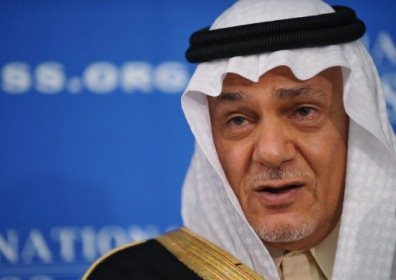Saudi ex-Spy Chief Says GCC Must Join P5+1, Iran Talks
إقرأ هذا الخبر بالعربية
Gulf Cooperation Council states must be part of the negotiations between major world powers and Iran, oil-rich Saudi Arabia's former intelligence chief said on Sunday.
Iran and major powers broke through a decade of gridlock on November 24 to agree an interim deal that would freeze parts of Iran's controversial nuclear program while easing some of the crippling international sanctions against it.
Sunni-dominated Saudi Arabia, Shiite Iran's arch-foe across the Gulf, had cautiously welcomed the deal.
"I suggest that the negotiations on Iran not be limited to the P5+1" comprising the United States, China, Britain, France and Germany, Prince Turki al-Faisal said.
"The Gulf Cooperation Council must be involved," added the influential Saudi royal, who also served as ambassador in both the United States and Britain.
"Iran is in the Gulf and any military effort will affect us all, let alone the environmental impact" Tehran's uranium enrichment program could have on the region, he said at the Manama Dialogue, a forum on Middle East security.
The West, Israel and Arab states in the Gulf have long suspected Iran of pursuing a nuclear weapons capability alongside its civilian program, a charge Tehran denies.
The temporary freeze is meant to make it more difficult for Iran to develop a nuclear weapon and to build confidence while Tehran and the P5+1 hammer out a long-term accord.
"Ongoing talks are incomplete and the presence of the GCC states on the (negotiating) table will benefit everyone," Faisal said.
He also urged the Islamic republic to end "its interference in Arab countries' affairs."
"The only way to improve relations is by Iran becoming a stability factor" in the region, he said.
Iranian Foreign Minister Mohammad Javad Zarif visited four GCC states last week to reassure them over the interim nuclear agreement.
Zarif did not visit Saudi Arabia, although he said he plans to do so in the future and appealed to the kingdom to work with Tehran to achieve regional stability.
Relations between the six GCC nations and Tehran have deteriorated further because of Iran's support for Syria's President Bashar Assad against mostly Sunni rebels.
Some Gulf monarchies also accuse Tehran of backing dissent in their countries.
The GCC, led by OPEC kingpin Saudi Arabia, also includes Bahrain, Kuwait, Oman, Qatar and the United Arab Emirates.



